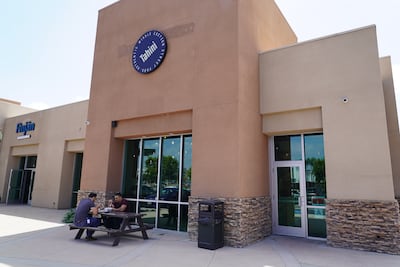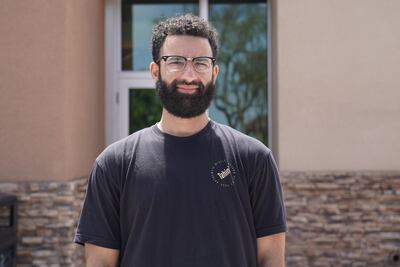Growing up in San Diego, Osama Shabaik longed for trips back to his parents’ native Egypt, where he would feast on shawarma, falafel and all the Middle Eastern street food Cairo had to offer.
Southern California had palm trees, the ocean breeze and hundreds of taco joints to choose from. But growing up in the 1990s and early 2000s, there was a dearth of good-quality Middle Eastern street food, Mr Shabaik said.
In 2017, the graduate of Harvard Law School decided to forgo a promising legal path and turned his love of Middle Eastern cuisine into a new and far less certain career.
He opened Tahini Authentic Middle Eastern Street Food with his best friend, Mahmoud Barkawi.

“Tahini was born out of a desire to be able to really enjoy the shawarma and the falafel that we grew up on, when we would go on trips back to the Middle East to visit family,” Mr Shabaik told The National.
What started as a pop-up restaurant at the side of a petrol station has transformed into a bricks-and-mortar restaurant that caters to San Diego's business community.
Situated on the outskirts of the city, Tahini’s open seating and spacious interior is sprinkled with nods to the Middle East, like the colourful lanterns that hang from the ceiling.
The menu is centred around shawarma and falafel, but customers can choose between bowls and pitas. Everything is halal.
“We try to keep our food as close and as similar to what you would find in the Middle East,” Mr Shabaik said.
Like many restaurants, Tahini was hit hard by the Covid-19 pandemic. It shifted gears and focused on deliveries.
While deliveries still make up a majority of sales, customers have started to return after two years away.
“We've been blessed to have a strong support group within the community, Mr Shabaik said.
In 2022, Tahini was named one of the top 100 Muslim start-ups by The Centre for Muslim Life, a Californian non-profit.
For Mr Shabaik, who came of age in post-9/11 America, being hailed a leader of his community was an honour.

“Tahini has really been a way in which we can kind of present our identity in very unapologetic fashion,” he said. “This is who we are and we're proud of who we are.”
While it may not have been the career his parents envisioned when he set off for law school, Tahini has allowed Mr Shabaik to embrace his Muslim identity and Middle Eastern heritage.
“Food is a shared language amongst everybody. It doesn't matter what race, religion, where you come from, what language you speak, we all speak the language of food,” he said.
“And being able to put a smile on someone's face after they have a meal is really for us the thing that I look forward to the most. I didn't always feel that I could get that with a law degree.”
Despite the pandemic, Mr Shabaik and his partner are expanding. They’re opening a coffee shop next door to Tahini and hope to open a second restaurant location in the coming months.

